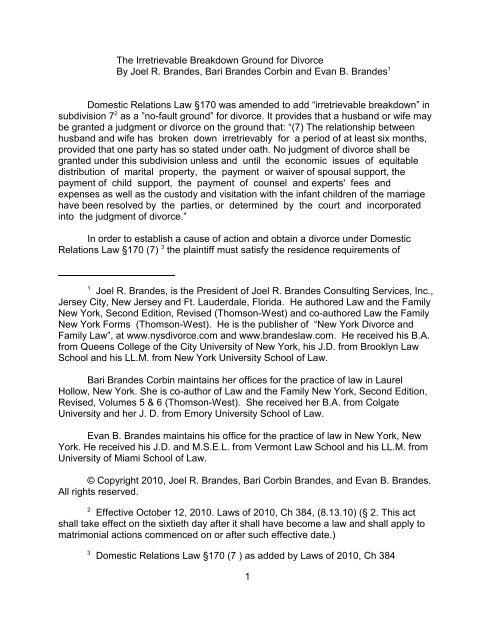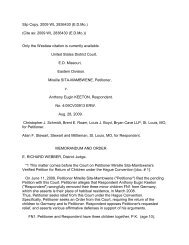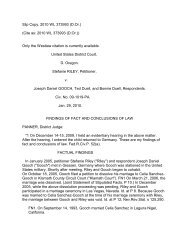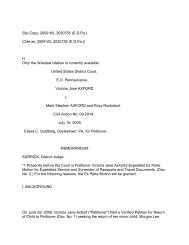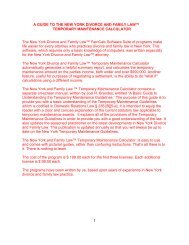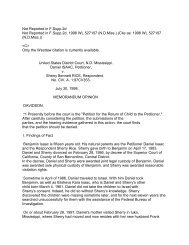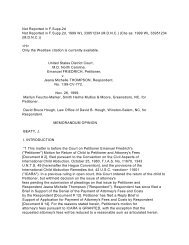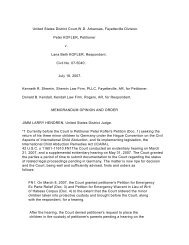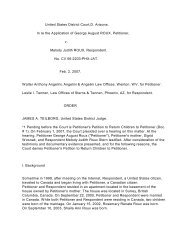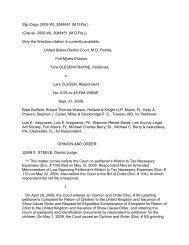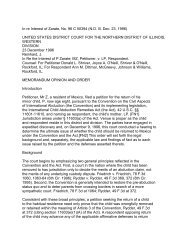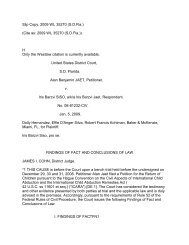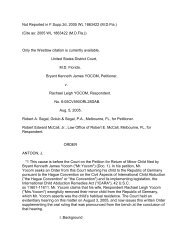The Irretrievable Breakdown Ground for Divorce By Joel R. Brandes ...
The Irretrievable Breakdown Ground for Divorce By Joel R. Brandes ...
The Irretrievable Breakdown Ground for Divorce By Joel R. Brandes ...
Create successful ePaper yourself
Turn your PDF publications into a flip-book with our unique Google optimized e-Paper software.
<strong>The</strong> <strong>Irretrievable</strong> <strong>Breakdown</strong> <strong>Ground</strong> <strong>for</strong> <strong>Divorce</strong><br />
<strong>By</strong> <strong>Joel</strong> R. <strong>Brandes</strong>, Bari <strong>Brandes</strong> Corbin and Evan B. <strong>Brandes</strong> 1<br />
Domestic Relations Law §170 was amended to add “irretrievable breakdown” in<br />
2<br />
subdivision 7 as a ”no-fault ground” <strong>for</strong> divorce. It provides that a husband or wife may<br />
be granted a judgment or divorce on the ground that: “(7) <strong>The</strong> relationship between<br />
husband and wife has broken down irretrievably <strong>for</strong> a period of at least six months,<br />
provided that one party has so stated under oath. No judgment of divorce shall be<br />
granted under this subdivision unless and until the economic issues of equitable<br />
distribution of marital property, the payment or waiver of spousal support, the<br />
payment of child support, the payment of counsel and experts' fees and<br />
expenses as well as the custody and visitation with the infant children of the marriage<br />
have been resolved by the parties, or determined by the court and incorporated<br />
into the judgment of divorce.”<br />
In order to establish a cause of action and obtain a divorce under Domestic<br />
3<br />
Relations Law §170 (7) the plaintiff must satisfy the residence requirements of<br />
1<br />
<strong>Joel</strong> R. <strong>Brandes</strong>, is the President of <strong>Joel</strong> R. <strong>Brandes</strong> Consulting Services, Inc.,<br />
Jersey City, New Jersey and Ft. Lauderdale, Florida. He authored Law and the Family<br />
New York, Second Edition, Revised (Thomson-West) and co-authored Law the Family<br />
New York Forms (Thomson-West). He is the publisher of “New York <strong>Divorce</strong> and<br />
Family Law”, at www.nysdivorce.com and www.brandeslaw.com. He received his B.A.<br />
from Queens College of the City University of New York, his J.D. from Brooklyn Law<br />
School and his LL.M. from New York University School of Law.<br />
Bari <strong>Brandes</strong> Corbin maintains her offices <strong>for</strong> the practice of law in Laurel<br />
Hollow, New York. She is co-author of Law and the Family New York, Second Edition,<br />
Revised, Volumes 5 & 6 (Thomson-West). She received her B.A. from Colgate<br />
University and her J. D. from Emory University School of Law.<br />
Evan B. <strong>Brandes</strong> maintains his office <strong>for</strong> the practice of law in New York, New<br />
York. He received his J.D. and M.S.E.L. from Vermont Law School and his LL.M. from<br />
University of Miami School of Law.<br />
© Copyright 2010, <strong>Joel</strong> R. <strong>Brandes</strong>, Bari Corbin <strong>Brandes</strong>, and Evan B. <strong>Brandes</strong>.<br />
All rights reserved.<br />
2<br />
Effective October 12, 2010. Laws of 2010, Ch 384, (8.13.10) (§ 2. This act<br />
shall take effect on the sixtieth day after it shall have become a law and shall apply to<br />
matrimonial actions commenced on or after such effective date.)<br />
3<br />
Domestic Relations Law §170 (7 ) as added by Laws of 2010, Ch 384<br />
1
4<br />
Domestic Relations Law § 230 , and, in addition, establish that: (1) the relationship<br />
between husband and wife is irretrievably broken; (2) <strong>for</strong> a period of at least six months;<br />
and (3) the plaintiff or defendant must state under oath that the relationship between<br />
husband and wife is irretrievably broken.<br />
However, no judgment of divorce may be granted upon such a finding unless<br />
and until the economic issues of equitable distribution of marital property, the payment<br />
or waiver of spousal support, the payment of child support, the payment of counsel and<br />
experts' fees and expenses as well as the custody and visitation with the infant children<br />
of the marriage have been resolved by the parties, or determined by the court and<br />
incorporated into the judgment of divorce. 5<br />
Where the parties to a contested action <strong>for</strong> a divorce have agreed that the<br />
divorce will be uncontested it has been the practice of New York courts to permit them<br />
to submit the matter to the court <strong>for</strong> determination upon affidavits and the required<br />
6<br />
papers , or to hold an inquest on a fault ground. Where the papers were submitted, the<br />
4<br />
§ 230. Required residence of parties<br />
An action to annul a marriage, or to declare the nullity of a void marriage, or <strong>for</strong><br />
divorce or separation may be maintained only when:<br />
1. <strong>The</strong> parties were married in the state and either party is a resident thereof when the<br />
action is commenced and has been a resident <strong>for</strong> a continuous period of one year<br />
immediately preceding, or<br />
2. <strong>The</strong> parties have resided in this state as husband and wife and either party is a<br />
resident thereof when the action is commenced and has been a resident <strong>for</strong> a<br />
continuous period of one year immediately preceding, or<br />
3. <strong>The</strong> cause occurred in the state and either party has been a resident thereof <strong>for</strong> a<br />
continuous period of at least one year immediately preceding the commencement of the<br />
action, or<br />
4. <strong>The</strong> cause occurred in the state and both parties are residents thereof at the time of<br />
the commencement of the action, or<br />
5. Either party has been a resident of the state <strong>for</strong> a continuous period of at least two<br />
years immediately preceding the commencement of the action.<br />
(Added L.1962, c. 313, § 10; amended L.1963, c. 685, § 3; L.1966, c. 254, § 9.)<br />
5<br />
Domestic Relations Law §170 (7 ) as added by Laws of 2010, Ch 384<br />
6<br />
22 New York Code Rules and Regulations §202.21(i)(2) provides that there<br />
shall be a Unified Court System Uncontested <strong>Divorce</strong> Packet which shall contain the<br />
official <strong>for</strong>ms <strong>for</strong> use in uncontested matrimonial actions. <strong>The</strong> packet shall be available<br />
in the office of the clerk of the Supreme Court in each county, and the <strong>for</strong>ms shall be<br />
filed with the appropriate clerk in accordance with the instructions in the packet. <strong>The</strong>se<br />
2
<strong>for</strong>ms shall be accepted by the Court <strong>for</strong> obtaining an uncontested divorce, and no<br />
other <strong>for</strong>ms shall necessary. <strong>The</strong> Court, in its discretion, may accept other <strong>for</strong>ms that<br />
comply with the requirements of law. <strong>The</strong> parties in uncontested matrimonial actions<br />
must use the <strong>for</strong>ms in the Unified Court System Uncontested <strong>Divorce</strong> Packet as set<br />
<strong>for</strong>th in section 202.21(i)(2), unless the court permits otherwise pursuant to that Section.<br />
<strong>The</strong> instructions in the uncontested divorce packet state that the following are the<br />
papers needed to obtain an uncontested divorce:<br />
• Summons With Notice (Form UD-1) OR<br />
• Summons (to be served with Verified Complaint) (Form UD-1a)<br />
• Verified Complaint (Form UD-2)<br />
• Affidavit of Service (Form UD-3)<br />
• Sworn Statement of Removal of Barriers to Remarriage (Form UD-4)<br />
• Affirmation (Affidavit) of Regularity (Form UD-5)<br />
• Affidavit of Plaintiff (Form UD-6)<br />
• Affidavit of Defendant (Form UD-7)<br />
• Child Support Worksheet (Form UD-8)<br />
• Note of Issue (Form UD-9)<br />
• Findings of Fact/Conclusions of Law (Form UD-10)<br />
• Judgment of <strong>Divorce</strong> (Form UD-11)<br />
• Notice of Entry (Form UD-12)<br />
• Self-Addressed and Stamped postcard<br />
• Certificate of DissolutionNo attribute value <strong>for</strong> attribute 1<br />
Outside of New York City, a Request <strong>for</strong> Judicial Intervention [Request <strong>for</strong> Judicial<br />
Intervention—Uncontested <strong>Divorce</strong> <strong>for</strong>m (UD-13)] must be submitted at the time Forms<br />
UD-3 through UD-11 are filed. A fee will be charged to file the Request <strong>for</strong> Judicial<br />
Intervention. 22 New York Code Rules and Regulations §202.6(b) provides that the<br />
filing of a request <strong>for</strong> judicial intervention and payment of the filing fee is not required in<br />
an uncontested action in New York City <strong>for</strong> annulment, divorce or separation.<br />
22 New York Code Rules and Regulations §202.50(c) provides that Judgments<br />
submitted to the court shall be accompanied by a completed <strong>for</strong>m UCS 113 (Unified<br />
Court System <strong>Divorce</strong> and Child Support Summary Form: Supreme Court).<br />
22 New York Code Rules and Regulations §202.21(i)(2) provides that:<br />
• the proposed judgments are numbered in the order in which they are received and<br />
submitted in sequence to the judge or referee.<br />
• Unless the court otherwise directs, the proof required by statute must be in writing, by<br />
affidavits, which must include a sufficient factual statement to establish jurisdiction, as<br />
well as all elements of the cause of action warranting the relief sought.<br />
• If the judge or referee believes that the papers are insufficient, the complaint will either<br />
be dismissed <strong>for</strong> failure of proof or a hearing will be directed to determine whether<br />
sufficient evidence exists to support the cause of action.<br />
• Whether upon written proof or at the conclusion of a hearing, the judge or referee will<br />
3
court would reserve decision until the resolution of the ancillary issues. Where the<br />
court held an inquest, the court would grant a judgment of divorce, but hold the entry of<br />
the judgment in abeyance pending the resolution of the ancillary issues. <strong>The</strong> practice of<br />
granting the judgment and holding its entry into abeyance pending the resolution of the<br />
ancillary issues is not permitted under subdivision 7 which prohibits the granting of a<br />
judgment of divorce until all of the ancillary issues are resolved by the parties, or<br />
determined by the court and incorporated into the judgment of divorce. However, the<br />
court can still hear the testimony and reserve decision.<br />
<strong>Irretrievable</strong> <strong>Breakdown</strong> Defined<br />
<strong>The</strong> term “irretrievably broken” is not defined in the statute. Black's Law<br />
7<br />
Dictionary states that “irretrievable breakdown of the marriage” is a ground <strong>for</strong> divorce<br />
that is based on incompatibility between marriage partners and that is used in many<br />
states as the sole ground of no-fault divorce. — Also termed irretrievable breakdown;<br />
irremediable breakdown of the marriage; irremediable breakdown. Cf. irreconcilable<br />
differences; incompatibility. However, it does not define the term which is different<br />
8<br />
from “irreconcilable differences” which Black's Law Dictionary defines as “persistent<br />
and unresolvable disagreements between spouses, leading to the breakdown of the<br />
marriage. • <strong>The</strong>se differences may be cited — without specifics — as grounds <strong>for</strong> nofault<br />
divorce. At least 33 states have provided that irreconcilable differences are a basis<br />
<strong>for</strong> divorce. Cf. irretrievable breakdown of the marriage; incompatibility.”<br />
An examination of the case law in other states which have adopted the<br />
“irretrievable breakdown” ground <strong>for</strong> divorce appear to indicate that a marriage has<br />
irretrievably broken down when the relationship is <strong>for</strong> all intents and<br />
9<br />
purposes ended. Where no guidelines are established as to what constitutes an<br />
10<br />
irretrievable breakdown, courts consider each case individually, and the determination<br />
whether the marriage is broken must be based on an inquiry into all the surrounding<br />
render a decision and sign the findings of fact, conclusions of law and the judgment,<br />
unless <strong>for</strong> reasons stated on the record decision is reserved.<br />
• Where a hearing has been held, no transcript of testimony is required as a condition<br />
precedent to the signing of the judgment, unless the judge or referee presiding shall so<br />
direct.<br />
7<br />
8<br />
9<br />
Black's Law Dictionary (8th ed. 2004)<br />
Black's Law Dictionary (8th ed. 2004)<br />
27A C.J.S. <strong>Divorce</strong> s 30 s 30. <strong>Irretrievable</strong> breakdown-What constitutes<br />
10<br />
See Flora v. Flora, 166 Ind. App. 620, 337 N.E.2d 846 (1st Dist.<br />
1975); Joy v. Joy, 178 Conn. 254, 423 A.2d 895 (1979).<br />
4
11<br />
facts and circumstances. In general, a marriage is irretrievably broken when, <strong>for</strong><br />
whatever reason or cause and no matter whose fault, the marriage relationship is <strong>for</strong> all<br />
12 13<br />
intents and purposes ended, when it is no longer viable, when the parties are<br />
unable, or refuse, to cohabit, or when it is beyond hope of reconciliation or repair. <strong>The</strong><br />
principal question to be determined is whether the marriage is at an end and beyond<br />
14<br />
reconciliation.<br />
In some states irretrievable breakdown of a marriage may be sufficiently shown<br />
15<br />
by both parties alleging the breakdown, or by one party seeking a divorce or<br />
dissolution on the ground of irretrievable breakdown, and the other seeking divorce or<br />
16<br />
dissolution on a ground involving misconduct. In some states the decision that a<br />
marriage is irretrievably broken need not be based on any identifiable objective fact. It is<br />
sufficient that one or both parties subjectively decide that their marriage is over and<br />
17<br />
there is no hope of reconciliation. Under one statute, where both parties by petition<br />
or otherwise have stated under oath or affirmation that the marriage is irretrievably<br />
broken, or one of the parties has so stated and the other has not denied it, the court,<br />
after considering the statement and holding a hearing on the matter must make a<br />
finding whether or not the marriage is irretrievably broken and enter an order of<br />
11<br />
12<br />
13<br />
See Nooe v. Nooe, 277 So. 2d 835 (Fla. Dist. Ct. App. 2d Dist. 1973).<br />
Ryan v. Ryan, 277 So. 2d 266 (Fla. 1973).<br />
Id.<br />
14<br />
Riley v. Riley, 271 So. 2d 181 (Fla. Dist. Ct. App. 1st Dist.<br />
1972).<br />
15<br />
Friedman v. Friedman, 233 Ga. 254, 210 S.E.2d 754 (1974).<br />
Under dissolution act, absent fraud or coercion, allegations that marriage is<br />
irretrievably broken are all that is required to support decree of dissolution, and judge<br />
has no function in evaluating evidence with respect to these grounds. Little v. Little, 96<br />
Wash. 2d 183, 634 P.2d 498 (1981).<br />
In accordance with statute, if parties execute written stipulation that their<br />
marriage has broken down irretrievably and submitted agreement concerning custody,<br />
care, education, visitation, maintenance or support of their children and concerning<br />
alimony and disposition of property, then court must make finding that marriage has<br />
irretrievably broken down. Sweet v. Sweet, 190 Conn. 657, 462 A.2d 1031 (1983).<br />
16<br />
17<br />
Herring v. Herring, 237 Ga. 771, 229 S.E.2d 756 (1976).<br />
Caffyn v. Caffyn, 441 Mass. 487, 806 N.E.2d 415 (2004).<br />
5
dissolution or dismissal accordingly. 18<br />
<strong>The</strong> consensus appears to be that the term “irretrievable breakdown” means a<br />
breakdown of the marriage to the point that reconciliation is not possible or probable.<br />
19<br />
For example, Alabama ‘s statute requires a finding that “further attempts at<br />
reconciliation are impractical or futile and not in the best interests of the parties or<br />
20<br />
family. <strong>The</strong> Delaware statute requires a finding that reconciliation is improbable as<br />
21<br />
proof that the marriage has irretrievably broken down. <strong>The</strong> Connecticut statute<br />
requires a period of separation “by reason of incompatibility” <strong>for</strong> a continuous period<br />
prior to the service of the complaint and that there is no reasonable prospect that they<br />
22<br />
will be reconciled.” <strong>The</strong> Illinois statute requires a period of separation and a finding<br />
that ef<strong>for</strong>ts at reconciliation have failed or that future attempts at reconciliation would be<br />
23<br />
impracticable and not in the best interests of the family. Kentucky laws provide that if<br />
one of the parties disputes that the marriage is irretrievably broken, the court must<br />
consider all relevant factors, including the prospect of reconciliation, and make a finding<br />
whether the marriage is irretrievably broken. <strong>The</strong> Wisconsin statute requires that the<br />
court find an irretrievable breakdown of the marriage with no possible chance at<br />
reconciliation. 24<br />
<strong>The</strong> Uni<strong>for</strong>m Marriage and <strong>Divorce</strong> Act § 305 (c) defines a finding of irretrievable<br />
breakdown as “a determination that there is no reasonable prospect of reconciliation.” 25<br />
Some states couple the irretrievable ground with a period of separation of<br />
26<br />
anywhere from sixty days to two years. For example Missouri law provides that if the<br />
defendant denies that the marriage is irretrievably broken, the plaintiff must prove one<br />
or more of what appear to be fault grounds, or that the parties have lived apart <strong>for</strong> 24<br />
18<br />
19<br />
20<br />
21<br />
22<br />
23<br />
24<br />
25<br />
26<br />
In re Marriage of Capstick, 547 S.W.2d 522 (Mo. Ct. App. 1977).<br />
Alabama State <strong>Divorce</strong> Code - Chapter 2, Section 30-2-1]<br />
See Delaware Code - Title 13 - Chapters: 1505<br />
Connecticut General Statutes § 46b-40(c)<br />
Illinois Compiled Statutes 750 - Chapter 5 - Section: 401<br />
Kentucky statutes - Title 35 - Chapter: 403.170<br />
Wisconsin Statutes; Section 767.07<br />
See Ula Marr & <strong>Divorce</strong> § 305<br />
Missouri Revised Statutes, Section 452.305.1 and 452.320<br />
6
27<br />
months. <strong>The</strong> Connecticut statute requires the parties to have lived apart by reason of<br />
incompatibility <strong>for</strong> a continuous period of at least the eighteen months. 28<br />
<strong>Irretrievable</strong> breakdown has been adopted as a ground <strong>for</strong> divorce in the<br />
29 30 31 32 33 34<br />
following 17 states: Alabama , Arizona , Colorado , Connecticut , Delaware ,<br />
27<br />
Connecticut General Statutes § 46b-40(c)<br />
28<br />
See also Delaware Code, Title 13, Chapter 1505; Illinois Compiled Statutes<br />
750, Chapter 5, Section 401; Kentucky statutes, Title 35, Chapter 403.170; Missouri<br />
Revised Statutes, Section 452.305.1 and 452.320; Pennsylvania Consolidated<br />
Statutes, Title 23, Section: 3104; Wisconsin Statutes, Section 767.07.<br />
29<br />
See Oppenheimer v. Oppenheimer, 22 Ariz. App. 238, 526 P.2d 762<br />
(Div. 2 1974); Posada v. Posada, 179 Conn. 568, 427 A.2d 406 (1980); Ryan v.<br />
Ryan, 277 So. 2d 266 (Fla. 1973); Harwell v. Harwell, 233 Ga. 89, 209 S.E.2d 625<br />
(1974); Abney v. Abney, 176 Ind. App. 22, 374 N.E.2d 264 (2d Dist. 1978); Caffyn v.<br />
Caffyn, 441 Mass. 487, 806 N.E.2d 415 (2004); Grotelueschen v. Grotelueschen, 113<br />
Mich. App. 395, 318 N.W.2d 227 (1982); Hagerty v. Hagerty, 281 N.W.2d 386 (Minn.<br />
1979); Mize v. Mize, 891 S.W.2d 895 (Mo. Ct. App. W.D. 1995); In re Marriage of<br />
Geror, 2000 MT 60, 299 Mont. 33, 996 P.2d 381 (2000); Little v. Little, 96 Wash. 2d<br />
183, 634 P.2d 498 (1981); In re Ried's Marriage, 212 N.W.2d 391 (Iowa 1973).<br />
30<br />
“<strong>The</strong> circuit court has power to grant a divorce based on the following causes:<br />
An irretrievable breakdown of the marriage where further attempts at reconciliation are<br />
impractical or futile and not in the best interests of the parties or family.” [Alabama State<br />
<strong>Divorce</strong> Code, Chapter 2, Section 30-2-1]<br />
31<br />
“<strong>Irretrievable</strong> breakdown of the marriage.” [Arizona Revised Statutes; Chapter<br />
25, Title 316].<br />
32<br />
“<strong>The</strong> only grounds <strong>for</strong> dissolution of marriage is that the marriage is<br />
irretrievably broken.” [Colorado Revised Statutes 14-10-106]<br />
33<br />
“A decree of dissolution of a marriage or a decree of legal separation shall be<br />
granted upon a finding that one of the following causes has occurred: <strong>The</strong> marriage has<br />
broken down irretrievably. <strong>The</strong> parties have lived apart by reason of incompatibility <strong>for</strong> a<br />
continuous period of at least the eighteen months immediately prior to the service of the<br />
complaint and that there is no reasonable prospect that they will be reconciled.” [<br />
Connecticut General Statutes § 46b-40(c)<br />
34<br />
“<strong>The</strong> Court shall enter a decree of divorce whenever it finds that the marriage<br />
is irretrievably broken and that reconciliation is improbable due to: Voluntary separation.<br />
Separation caused by respondent's misconduct. Separation caused by respondent's<br />
mental illness. Separation caused by incompatibility. Bona fide ef<strong>for</strong>ts to achieve<br />
7
35 36 37 38 39 40 41<br />
Florida , Georgia , Hawaii , Illinois , Indiana , Kentucky , Massachusetts ,<br />
reconciliation prior to divorce, even those that include, temporarily, sleeping in the same<br />
bedroom and resumption of sexual relations, shall not interrupt any period of living<br />
separate and apart, provided that the parties have not occupied the same bedroom or<br />
had sexual relations with each other within the 30-day period immediately preceding the<br />
day the Court hears the petition <strong>for</strong> divorce.” [Delaware Code, Title 13, Chapter 1505]<br />
35<br />
“A dissolution of marriage in Florida may be granted based on the following<br />
grounds: <strong>The</strong> marriage is irretrievably broken.” [Florida Statutes 61.052]<br />
36<br />
“<strong>The</strong> following grounds <strong>for</strong> divorce are recognized in the state of Georgia:<br />
(13) <strong>Irretrievable</strong> breakdown of the marriage.” [Georgia Code, Section 19-5-3]<br />
37<br />
“A divorce may be granted on the following grounds: <strong>The</strong> marriage is<br />
irretrievably broken.” [Hawaii Revised Statutes 580-41]<br />
38<br />
That the spouses have lived separate and apart <strong>for</strong> a continuous period in<br />
excess of 2 years and irreconcilable differences have caused the irretrievable<br />
breakdown of the marriage and the court determines that ef<strong>for</strong>ts at reconciliation have<br />
failed or that future attempts at reconciliation would be impracticable and not in the best<br />
interests of the family. If the spouses have lived separate and apart <strong>for</strong> a continuous<br />
period of not less than 6 months next preceding the entry of the judgment dissolving the<br />
marriage, as evidenced by testimony or affidavits of the spouses, the requirement of<br />
living separate and apart <strong>for</strong> a continuous period in excess of 2 years may be waived<br />
upon written stipulation of both spouses filed with the court. [Illinois Compiled Statutes<br />
750, Chapter 5, Section 401]<br />
39<br />
“Dissolution of marriage shall be decreed upon a finding by a court of one of<br />
the following grounds: <strong>Irretrievable</strong> breakdown of the marriage.”[Indiana Code Title 31 -<br />
Article 15, Chapter 2-3]<br />
40<br />
“403.170 Marriage -- <strong>Irretrievable</strong> breakdown. (1) If both of the parties by<br />
petition or otherwise have stated under oath or affirmation that the marriage is<br />
irretrievably broken, or one of the parties has so stated and the other has not denied it,<br />
the court, after hearing, shall make a finding whether the marriage is irretrievably<br />
broken. No decree shall be entered until the parties have lived apart <strong>for</strong> 60 days. Living<br />
apart shall include living under the same roof without sexual cohabitation. <strong>The</strong> court<br />
may order a conciliation conference as a part of the hearing. (2) If one of the parties<br />
has denied under oath or affirmation that the marriage is irretrievably broken, the court<br />
shall consider all relevant factors, including the circumstances that gave rise to filing the<br />
petition and the prospect of reconciliation, and shall: (a) Make a finding whether the<br />
marriage is irretrievably broken; or (b) Continue the matter <strong>for</strong> further hearing not fewer<br />
than 30 nor more than 60 days later, or as soon thereafter as the matter may be<br />
reached on the court's calendar, and may suggest to the parties that they seek<br />
8
42 43 44 45 46<br />
Minnesota, Missouri, Nebraska, Pennsylvania, and Wisconsin. However,<br />
none of the state laws define the term irretrievable breakdown.<br />
counseling. <strong>The</strong> court, at the request of either party shall, or on its own motion may,<br />
order a conciliation conference. At the adjourned hearing the court shall make a finding<br />
whether the marriage is irretrievably broken. (3) A finding of irretrievable breakdown is a<br />
determination that there is no reasonable prospect of reconciliation.”[Kentucky statutes,<br />
Title 35, Chapter: 403.170]<br />
41<br />
“ <strong>Irretrievable</strong> breakdown of the marriage. “[General Laws of Massachusetts<br />
Chapter 208-1 and 208-2]<br />
42<br />
“<strong>Irretrievable</strong> breakdown of the marriage relationship”. [Minnesota Statutes,<br />
Chapter 518.06]<br />
43<br />
“A dissolution of marriage may be granted on the grounds that there remains<br />
no reasonable likelihood that the marriage can be preserved and that there<strong>for</strong>e the<br />
marriage is irretrievably broken. If the defendant denies that the marriage is irretrievably<br />
broken, the plaintiff must prove one or more of the following: <strong>The</strong> respondent committed<br />
adultery and to continue the marriage would be intolerable; <strong>The</strong> respondent has<br />
behaved in such a way that continuing the marriage would be intolerable; <strong>The</strong><br />
respondent abandoned the petitioner <strong>for</strong> at least six months prior to the filing of the<br />
petition; That the parties have lived separate and apart by mutual consent <strong>for</strong> at least<br />
12 months prior to filing; That the parties have lived separate and apart <strong>for</strong> a continuous<br />
period of at least 24 months be<strong>for</strong>e filing.” [Missouri Revised Statutes, Section<br />
452.305.1 and 452.320]<br />
44<br />
“ Nebraska bases dissolution on the basis of the marriage being irretrievably<br />
broken. If there is no dispute that the marriage is irretrievably broken, the court, after<br />
hearing, shall make a finding whether the marriage is irretrievably broken”. [Nebraska<br />
Statutes, Chapter 42, Section 361]<br />
45<br />
“<strong>Irretrievable</strong> breakdown. <strong>The</strong> court may grant a divorce where a complaint<br />
has been filed alleging that the marriage is irretrievably broken and an affidavit has<br />
been filed alleging that the parties have lived separate and apart <strong>for</strong> a period of at least<br />
two years and that the marriage is irretrievably broken.” [Pennsylvania Consolidated<br />
Statutes, Title 23, Section 3104]<br />
46<br />
“<strong>Irretrievable</strong> breakdown of the marriage is the only grounds <strong>for</strong> divorce in<br />
Wisconsin. <strong>The</strong> irretrievable breakdown of the marriage may be shown by: A joint<br />
petition by both spouses requesting a divorce on these grounds. Living separate and<br />
apart <strong>for</strong> 12 months immediately prior to filing. If the court finds an irretrievable<br />
breakdown of the marriage with no possible chance at reconciliation.’ [Wisconsin<br />
Statutes, Section 767.07]<br />
9
Sufficiency of Proof and Defenses<br />
It is clear from the statute that the court must find that the marriage is<br />
irretrievably broken as a predicate to the granting of a divorce. On its face Domestic<br />
Relations Law § 170(7) appears to allow the court to grant a judgment of divorce where<br />
one spouse states under oath that the relationship between husband and wife is<br />
47<br />
irretrievably broken. This construction would eliminate any defenses to this ground.<br />
However, the authority in other jurisdictions which have adopted this ground <strong>for</strong> a<br />
divorce supports the conclusion that the defendant can raise the defense that the<br />
marriage is not irretrievably broken. Moreover, this construction does not eliminate the<br />
five year statute of limitations applicable to actions <strong>for</strong> a divorce. <strong>The</strong> Domestic<br />
Relations Law provides that no action <strong>for</strong> divorce may be maintained on a ground which<br />
arose more than five years be<strong>for</strong>e the date of the commencement of the action except<br />
48<br />
where abandonment or separation pursuant to agreement or decree is the ground.<br />
--------------------------------------------------------------------------------<br />
However, in those states where irretrievable breakdown is a ground <strong>for</strong> divorce it<br />
has been held that the court presiding over an action <strong>for</strong> divorce on the ground of<br />
irretrievable breakdown has a duty to determine whether the marriage is, in fact,<br />
irretrievably broken. 49<br />
47<br />
48<br />
49<br />
Domestic Relations Law §170 (7 ) as added by Laws of 2010, Ch 384<br />
Domestic Relations Law § 210<br />
Mize v. Mize, 891 S.W.2d 895 (Mo. Ct. App. W.D. 1995)<br />
10


